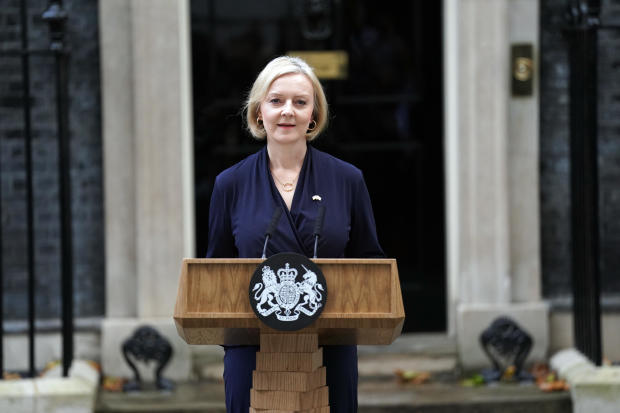U.K. Prime Minister Liz Truss announces resignation amid party rebellion sparked by economic plan
London — U.K. Prime Minister Liz Truss said on Thursday that she would resign after a rising chorus of members of her own party called for her to step down. Support for the premiere collapsed spectacularly not even two months into her tenure, with a final straw seeming to be a parliamentary vote Wednesday evening that descended into total chaos, with members of her Conservative party shouting and swearing at each other, and some even claiming they had been physically manhandled.
"We set out a vision for a low tax, high growth economy that would take advantage of the freedoms of Brexit. I recognize though, given the situation, I cannot deliver the mandate on which I was elected by the Conservative party. I have therefore spoken to His Majesty the King to notify him that I am resigning as leader of the Conservative party," Truss said outside the prime minister's official residence at Number 10 Downing Street in London.
Truss is the shortest serving prime minister in U.K. history, having taken office only 45 days ago. She sent financial markets reeling early in her tenure when she unveiled a tax cut-focused economic plan alongside her then-finance minister Kwasi Kwarteng. The plan caused the pound's value to plummet, interest rates to soar and the International Monetary Fund take the unusual step of publicly urging the U.K. to reverse course. Truss then fired Kwarteng and u-turned on a number of her proposed fiscal policies.
On Thursday, Truss said she would remain as prime minister until the members of her party choose a new leader. She promised a party leadership election within a week, "to ensure that we remain on a path to deliver our fiscal plans and maintain our country's economic stability and national security."
In the House of Commons on Wednesday, a vote on the future of fracking in the U.K. had initially been billed by Conservative party whips as a confidence vote in the government; Conservative members of parliament (MPs) were told that if they didn't back the government's position in favor of fracking, they'd be expelled from the party. It would have put a lot of MPs in the position of being forced to support fracking despite their opposition to the controversial practice.
Just minutes before the vote, however, Truss' government said it would no longer be taken as a confidence vote. The reversal led to confusion, which descended into chaos. One Conservative MP was quoted anonymously by multiple British news outlets as deriding the debacle as "the most bullying, screaming and shouting" they had ever seen, while another was heard saying, "I am f****** furious and I don't give a f*** any more."
Senior Conservative MP Charles Walker expressed his outrage to a BBC News crew that was covering the events live as they unfolded inside the House of Commons on Wednesday night.
"This whole affair is inexcusable," Walker told BBC News. "It is a pitiful reflection on the parliamentary Conservative Party at every level, and it reflects really badly, obviously, on the government of the day."
"I'm livid, and you know, I really shouldn't say this, but I hope all those people that put Liz Truss in Number 10 — I hope it was worth it. I hope it was worth it for the ministerial red box, I hope it was worth it to sit round the cabinet table. Because the damage they have done to our party is extraordinary… I've had enough. I've had enough of talentless people putting their tick in the right box — not because it's in the national interest, but because it's in their own personal interest to achieve ministerial position."
Members of the opposition Labour party have been demanding a new general election for weeks, eager to capitalize on the chaos gripping their opponents and take over the British government for the first time in more than a decade. In the U.K., general elections must be held every five years, at least. They are scheduled by the serving government. The deadline for the next general election to take place is January 2025, and with Conservatives polling at historic lows against the opposition Labour party, they would be extremely reluctant to call one soon.
"The Tory party is doing huge damage to our economy and to the reputation of our country, and the public are paying with higher prices, with higher mortgages," Kier Starmer, head of the opposition Labour party, said after Truss' resignation Thursday. "The public are entitled to have their say, and that's why there should be a general election."
